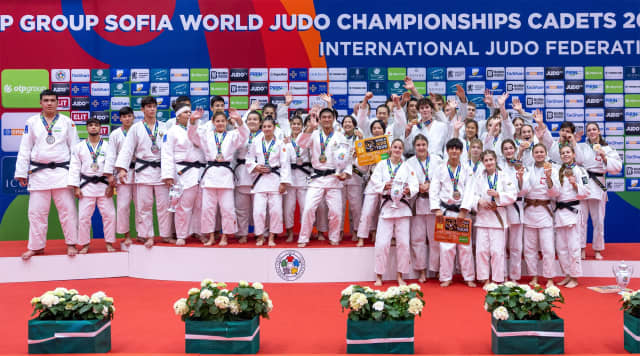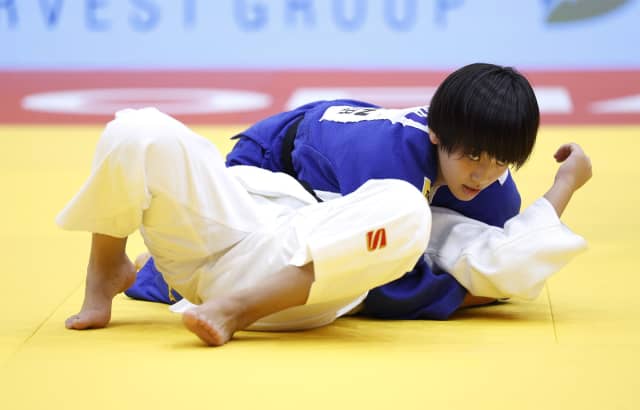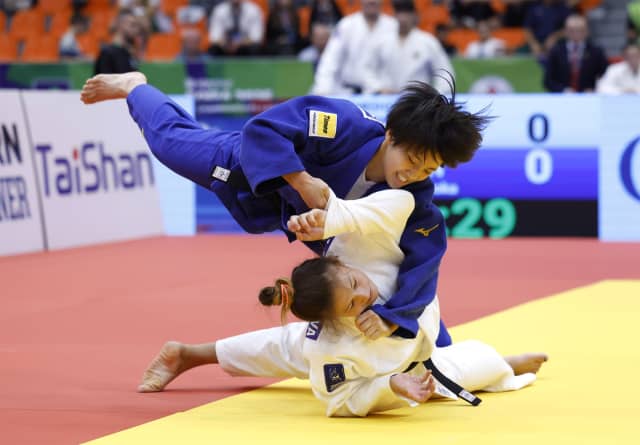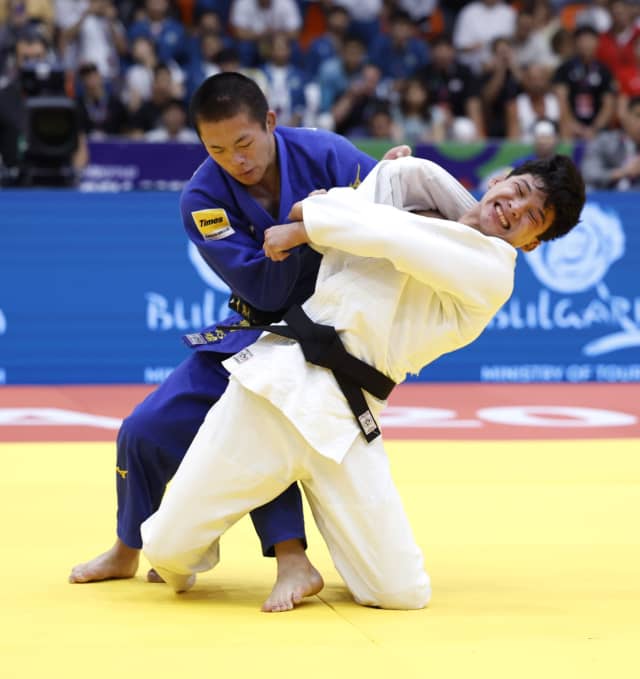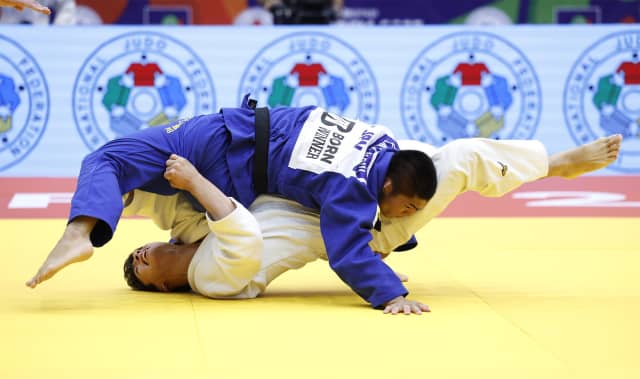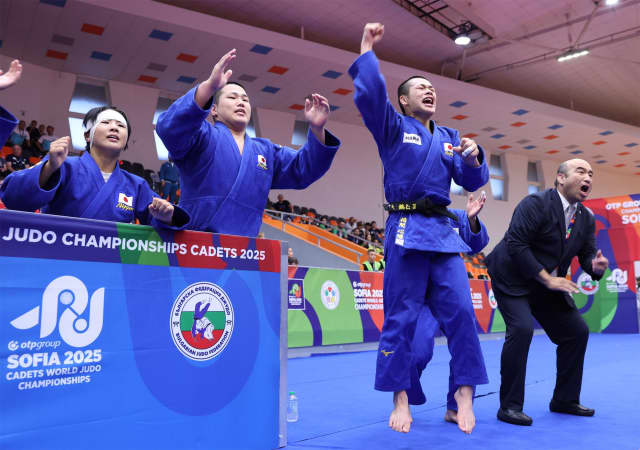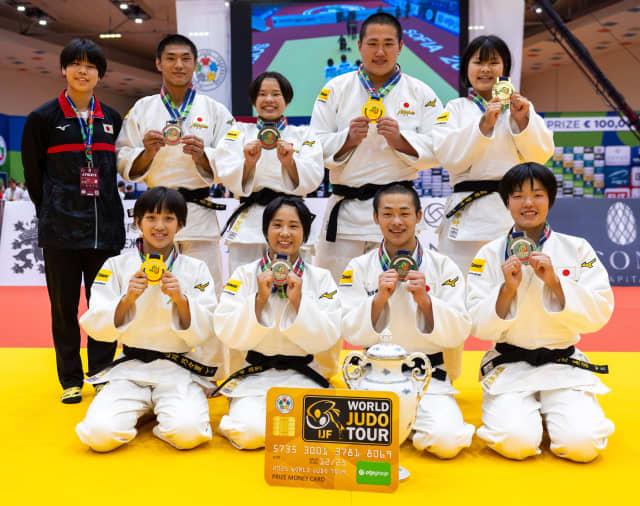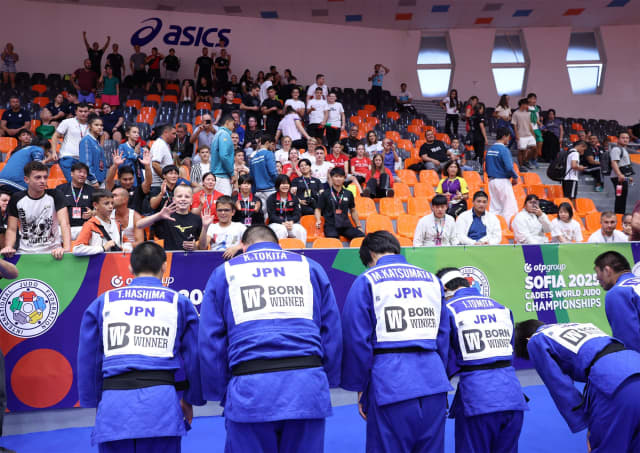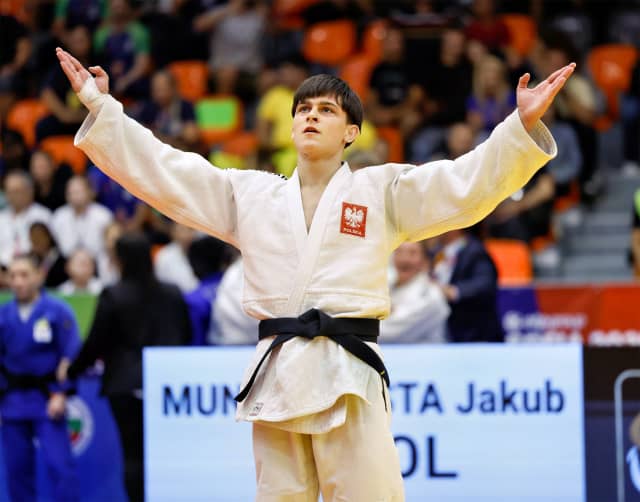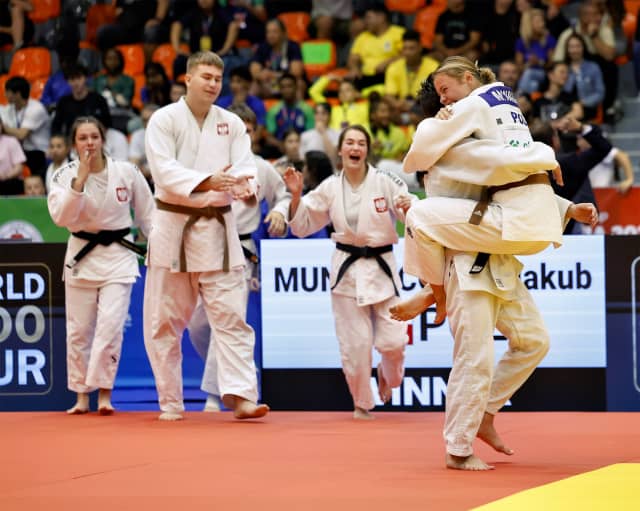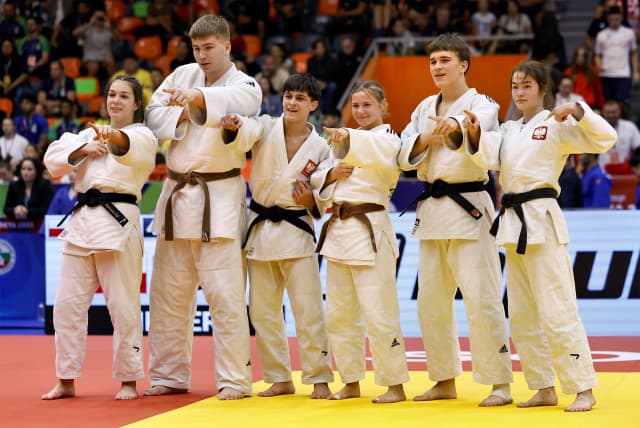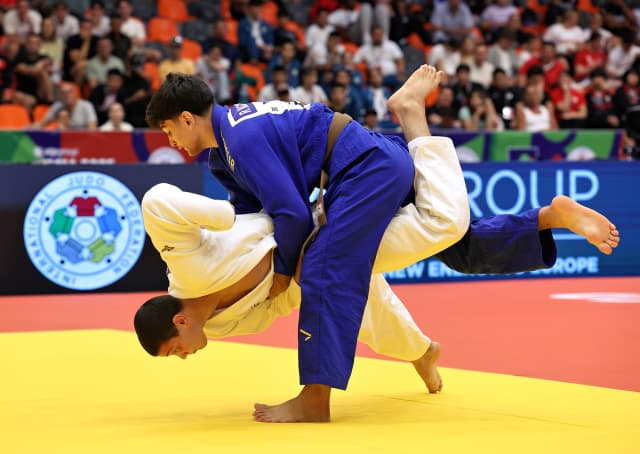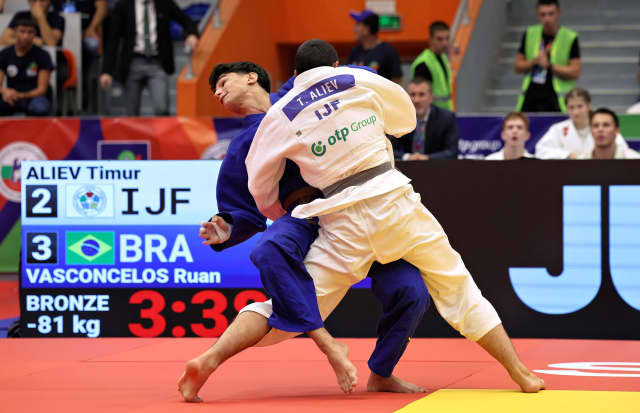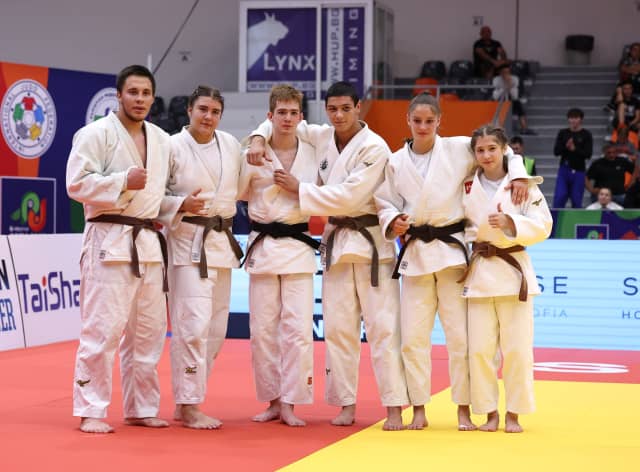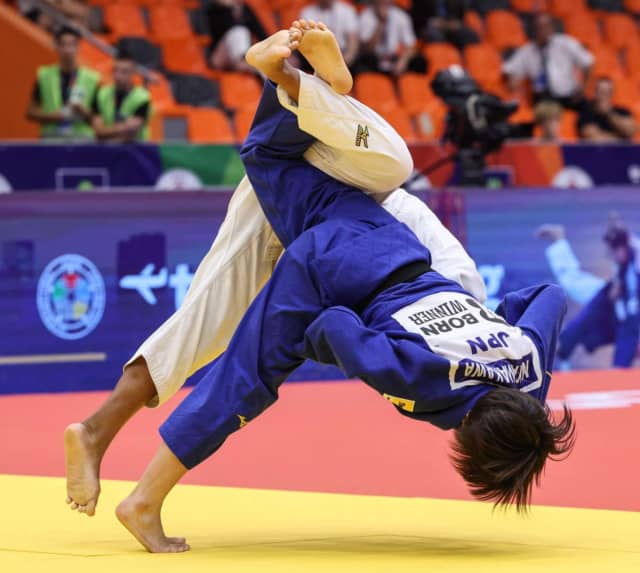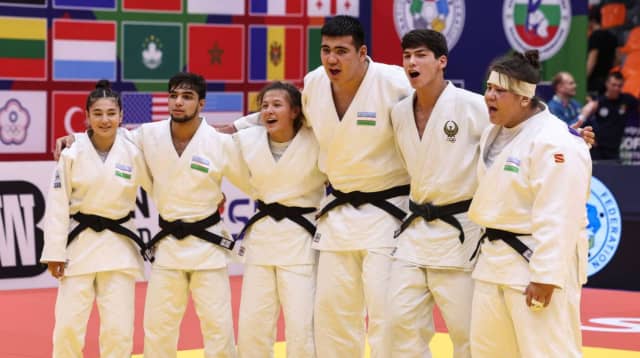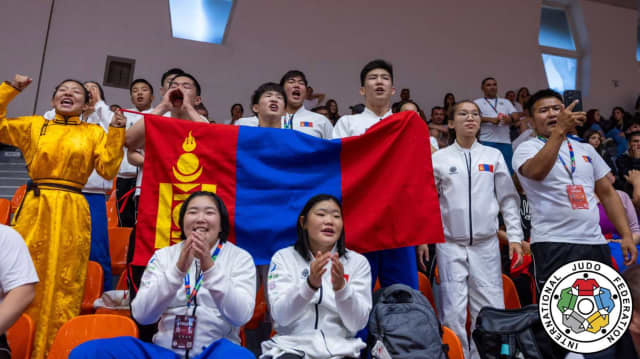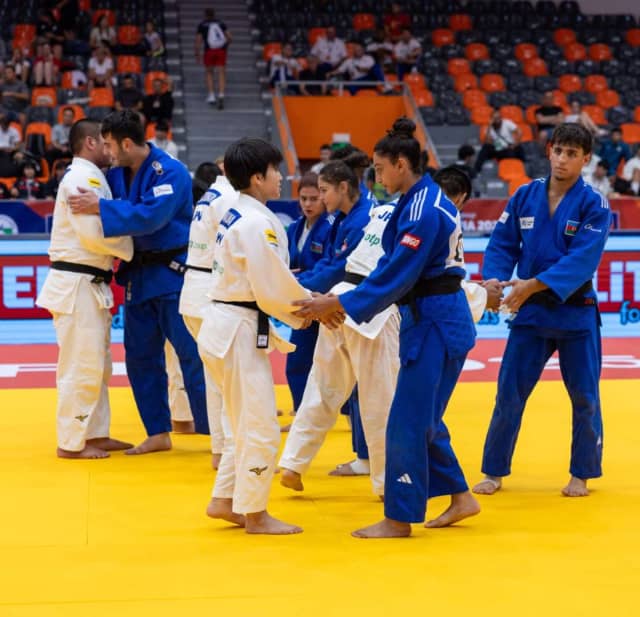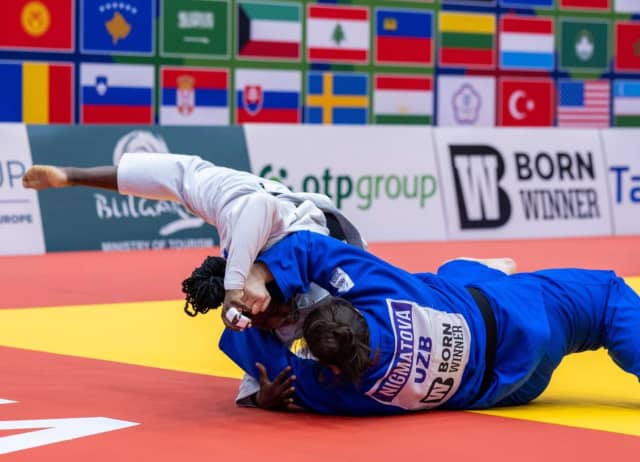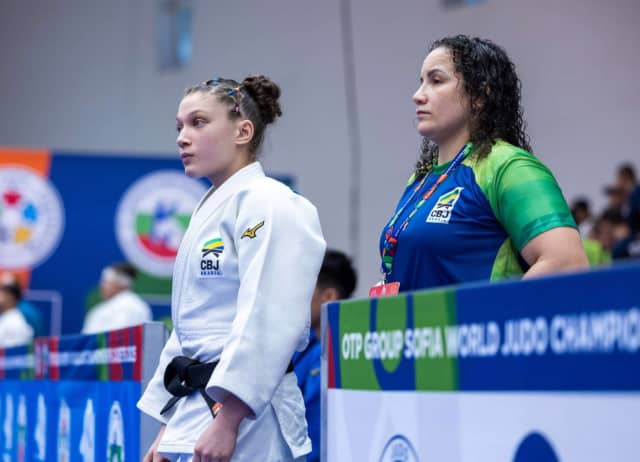FINAL RESULTS
- 1 - Japan
- 2 - Uzbekistan
- 3 - Poland
- 3 - International Judo Federation
- 5 - Brazil
- 5 - Mongolia
- 7 - Azerbaijan
- 7 - Kazakhstan
Final: Japan Strikes Back to Retain the Crown
The final between Uzbekistan and Japan promised fireworks and it delivered a gripping contest that swung back and forth before the defending champions once again emerged on top.

The opening bout saw newly crowned cadet world champion Umida Nigmatova (UZB) stamp her authority on the match immediately, throwing Misuzu Katsumata (JPN) with a thunderous ura-nage inside the first minute. Uzbekistan took the lead, 1–0. Next up, Alibek Durdiev (UZB) faced Kaito Tokita (JPN). Durdiev struck first with a yuko from a well-timed counter but Tokita piled on the pressure. Penalised twice, Durdiev bent without breaking, holding his nerve to preserve his lead and deliver a second point for his team. Uzbekistan were flying at 2–0.
Japan struck back in the third contest though; Iori Tomita (JPN) against Dinora Khasanova (UZB). Despite being physically less imposing in tachi-waza, Tomita’s groundwork was exemplary. Controlling her opponent step by step, she patiently rolled Khasanova onto her back and secured a textbook hold-down for ippon. It was a masterclass in ne-waza and pulled Japan back to 2–1.
The fourth match between Khushnudbek Burkhonov (UZB) and Toai Hashima (JPN) was a tactical and technical showcase worthy of the senior level. Both judoka showed ambition, with Hashima producing a spectacular standing seoi-otoshi that Burkhonov somehow escaped, like a cat. With no score at the end of normal time, the bout went into golden score. After 3:14 of added time, Burkhonov attempted a seoi-otoshi that lacked full preparation and Hashima capitalised, countering solidly to snatch the equalising point for Japan. The score was now 2–2 and the tension was electric.
Momentum shifted further in the fifth contest. Nonoka Yamakawa (JPN) imposed her grip early against Maftuna Akhmedova (UZB), scoring a yuko from an uchi-mata before chaining into o-uchi-gari. Once again, Japan’s excellence on the ground proved decisive; Yamakawa locked in an unbreakable hold-down for ippon. Japan now led 3–2, having turned the tie around completely.
That left Inomjon Bakhodirov (UZB) and Keisho Mitsuishi (JPN) to settle matters in a potential decider. The stakes were enormous. Mitsuishi nearly sealed it with a stunning seoi-otoshi but Bakhodirov escaped, miraculously. Time expired with no leader, sending the contest into golden score. Barely a minute into overtime, Mitsuishi trapped his opponent on the ground. Bakhodirov wriggled free once but the Japanese judoka persisted, securing the immobilisation a second time and this time for the full five seconds required.
The Japanese bench erupted. From 0–2 down, they had rallied to claim a 4–2 victory, underlining their extraordinary team spirit and collective strength. Japan are the mixed team world champions once again in Sofia, proving that even in transition, their unity and resilience remain second to none.
Bronze Medal Contest: Poland Storm to Bronze with a 4–0 Victory
The first bronze medal contest brought Poland and Mongolia together and from the opening contest the Polish team looked determined to seize their place on the podium. In the opening bout, Roksana Zys (POL) set the tone in emphatic fashion, throwing Maralmaa Khurelchuluun (MGL) for ippon to give her team the lead. Next, Dawid Kaminski (POL) faced Amartuvshin Namsraijav (MGL).
The Mongolian raised his team’s hopes briefly with a strong opening waza-ari, only for the score to be annulled due to a leg-grabbing penalty. Kaminski took full advantage, first scoring yuko before finishing moments later with a spectacular ippon to extend Poland’s lead to 2–0.
The third contest saw Barbara Twarowska (POL) take on Misheel Altanshagai (MGL). Altanshagai struck first, earning a yuko, but Twarowska showed remarkable resilience, countering for waza-ari and transitioning directly into a hold-down for ippon. That gave Poland their third point, leaving them just one victory away from the medal. It was Jakub Muniz Acosta (POL) who delivered the decisive blow against Tegsh-Ochir Narmandakh (MGL). After scoring a yuko, he followed with waza-ari, and with Poland already celebrating, the score was upgraded to ippon after video review. The bronze was sealed, with Poland completing a dominant display.
The final two contests, Magdalena Walega (POL) vs Tsendbazar Mashbat (MGL) and Jeremiasz Betrowski (POL) vs Temuulen Bayarjavkhlan (MGL), were not fought, the outcome already decided.
Final score: Poland 4–0 Mongolia. The bronze medal was for Poland.
Bronze Medal Contest: IJF Edge Brazil in a Golden Score Thriller
The bronze medal clash between Brazil and the team representing the IJF was every bit as dramatic as expected, going the full distance and beyond before the winner was decided. The opening contest saw Aleksandra Repiakh (IJF) and Agatha Paixao (BRA) locked in a tense battle that extended into golden score. After a long additional period, it was Paixao who finally found the breakthrough, giving Brazil the lead.
Denis Kuligin (IJF) levelled matters in the second bout, against Cesar De Godoy Tristante (BRA). Although the contest was close, Kuligin’s physical dominance told in the end. After forcing two penalties against his opponent, he struck with a powerful o-uchi-gari for ippon in the final thirty seconds. The match was even at 1–1.
In the third contest, Alina Gadanova (IJF) faced cadet world champion Clarice Ribeiro (BRA). Ribeiro was sharp from the outset, scoring yuko with an o-uchi-gari and appearing fully in control but over-confidence nearly cost her as she was countered for waza-ari. Displaying maturity beyond her years, Ribeiro responded decisively, scoring a waza-ari of her own with a ko-soto-gari before finishing with a hold-down. Brazil moved ahead 2–1.
Nart Naguchev (IJF) restored parity in the fight against Lucas Yamamoto (BRA), the fourth bout. A well-timed yuko inside the opening thirty seconds was enough for Naguchev to control the contest, levelling the score at 2–2. Brazil pulled ahead again thanks to Anna Julia Sperling, who threw Aishat Alieva (IJF) for ippon, giving her team a crucial 3–2 advantage. The sixth contest brought all the tension of a deciding tie. Timur Aliev (IJF) met Ruan Vasconcelos (BRA) and midway through the bout Aliev struck for a yuko. With the pressure mounting, he extended his lead with a sweeping o-uchi-gari for waza-ari. The IJF team had drawn level at 3–3, forcing the tie into a golden score contest.
The draw selected the +81 kg category, meaning a rematch between Denis Kuligin (IJF) and Cesar De Godoy Tristante (BRA). This time Kuligin wasted no time, securing a decisive armlock for ippon and delivering the victory. Final score: IJF 4–3 Brazil. The IJF team claim bronze after a thrilling golden score finish.
Semi-Finals: Uzbekistan and Japan Set Up Final Showdown
After the drama of the repechage, the semi-finals confirmed the two nations who would fight for gold, Uzbekistan and Japan, though the path was anything but straightforward.
In the clash between Brazil and Japan, it was the defending champions who struck first, racing to a 3–0 lead. Brazil looked in danger of being swept aside, but triple cadet world champion Clarice Ribeiro reignited her team’s hopes, winning by strangle to bring the score back to 3–1. Meanwhile, on the neighbouring tatami, Uzbekistan also stormed ahead, winning their first three contests against Mongolia before conceding a point, leaving the score at 3–1. Teams in both matches still had everything to play for.
Back on the Brazil–Japan mat, Toai Hashima stepped up in the -60 kg category, determined to seal victory for Japan. To the surprise of many, it was the Brazilian who prevailed, cutting the deficit to 3–2, but the decisive contest fell to Nonoka Yamakawa, who, despite struggling earlier in the week and in the preliminary rounds. She rediscovered her energy and composure at just the right moment. Her victory delivered the crucial point and sent Japan into yet another mixed team final.
For Mongolia, there was still hope after they clawed the scoreline back to 3–2 against Uzbekistan. Yet the Central Asian powerhouse proved too strong, sealing the decisive fourth win to confirm their place in the final. The stage was thus set for the gold medal contest: Uzbekistan vs Japan.
Meanwhile, the bronze medal line-up was also confirmed: IJF vs Brazil and Poland vs Mongolia.
Quarter-Finals: Uzbekistan Hold Their Nerve, Brazil Advance with Authority
Riding the momentum of their opening win over France, Uzbekistan moved into the quarter-finals against Kazakhstan. On paper, some might have expected a straightforward victory but the reality was anything but. After six tense bouts, the scoreboard showed three wins apiece, leaving everything to be decided by a draw for the golden score contest. The chosen category was -63 kg and it was Zukhrajon Umarova who seized the moment, claiming the decisive victory and propelling Uzbekistan into the semi-finals. More than ever, they looked like the team to beat.
The tie between Mongolia and the IJF team was almost as close. Once again the outcome hinged on the later contests, but it was Tsolmon-Od Baljinnyam who delivered the winning point to secure a 4–2 victory for the Mongolians, keeping their medal hopes alive.
In the third quarter-final, a focused and disciplined Brazil dropped only one contest against Poland, sealing a 4–1 win to book their place in the semi-finals. Their opponents would be Japan, who justified their status as defending champions with a controlled victory over Azerbaijan in the last quarter-final of the day.
The semi-final line-up was now confirmed: Uzbekistan vs Mongolia and Brazil vs Japan.
First Round: Uzbekistan Stun France
The opening round of the mixed team competition delivered drama from the very first ties. For France, finalists last year in Lima, the draw could hardly have been tougher. Pitted straight away against an Uzbekistan team fired up by their five gold medals from the individual tournament, the French judoka faced a monumental task. The result was emphatic: Uzbekistan advanced with a 4–1 victory, although the scoreline did not reflect the intensity of some of the contests. Notably, Astan Sacko (FRA) pushed newly crowned +70 kg world cadet champion Umida Nigmatova (UZB) to the limit in an epic battle before ultimately conceding defeat.
Also in pool A, Kazakhstan overcame the host nation Bulgaria by the same margin, 4–1, despite the passionate support of the home crowd, who roared for their athletes to the very end.
Pool B proved tighter. Mongolia were tested by Chinese Taipei but eventually secured their place in the next round with a 4–2 win. The clash between the IJF team and Germany was equally close. With the score tied at 2–2 heading into the final contests, the IJF squad held their nerve to prevail 4–2.
In pool C, the results were far clearer. Brazil dominated Canada with a clean sweep, 4–0, while Poland also advanced with the same scoreline against Greece.
Pool D produced one of the biggest surprises of the morning. Azerbaijan eliminated Georgia, denying them the chance to repeat the triumph of their senior team in Budapest earlier this year. Meanwhile, Japan began their campaign with a solid victory over Belarus, who fought valiantly but could not stop the defending champions from moving forward.

